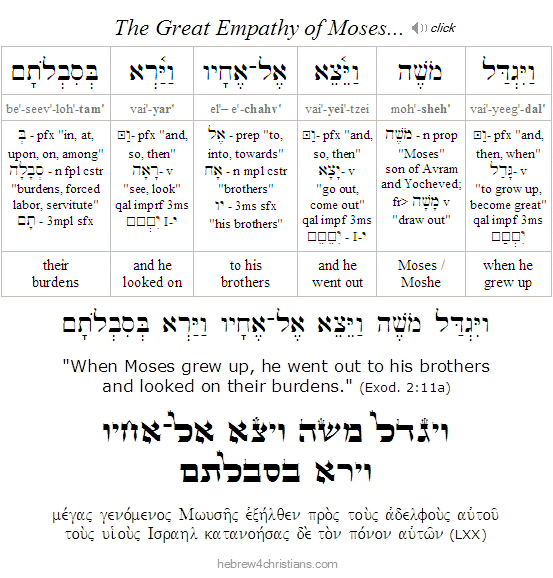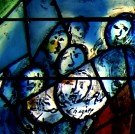|
From our Torah portion this week (Shemot) we read: "when Moses grew up, he went out to his people and looked on their burdens" (Exod. 2:11). The sages say, "do not read, 'grew up,' but rather 'became great'" (וַיִּגְדַּל), since Moses chose to experience the exile for himself by opening his eyes to his people's suffering. Indeed Moses was made great as he emptied himself of his royal privilege and identified with the pain and misfortunes of others (Phil. 2:7). As is written: "By faith Moses was made great (μέγας γενόμενος) by refusing to be called the son of Pharaoh's daughter, choosing rather to be mistreated with the people of God than to enjoy the fleeting pleasures of sin" (Heb. 11:24-25).
Regarding this verse the great Torah commentator Rashi wrote, "Moses set his eyes and heart to feel their anguish." The midrash says that when Moses saw the hard labor of the people, he took their yoke upon him. Indeed some of the earlier sages said that sharing the burden of another is the essence of Torah, the very foundation of all heavenly obligation (Avot 6:6). Therefore the Apostle Paul wrote (Gal. 6:2): "Bear one another's burdens, and so fulfill the Torah of the Messiah (תּוֹרַת הַמָּשִׁיחַ)." Expressing empathy by identifying with the pains of others requires what is called bittul hayesh (בִּטּוּל הַיֵּשׁ), or the setting aside of the ego, which is also the essential requirement for revelation from heaven. Hence Moses was given direct encounter with the Divine Presence because of his great humility.
Hebrew Lesson
Exodus 2:11a Hebrew reading (click):
 |
In order to say, "thy kingdom come, thy will be done" you must let go of your own agenda; your ego must be deposed from its petty little kingdom... Likewise, you can't say, "Come, Lord Jesus" by putting your fear first, or by otherwise demanding that your life should center on your own personal "advent." No, you must consciously choose to live in exile to this world (Gal. 6:14). How can we ever expect the LORD to live out His life through us if we do not genuinely offer our lives to Him? And yet this is exactly the problem of the ego...
A principle of spiritual life is that we descend in order to ascend, or the "the way up is the way down." As Yeshua said, "Whoever would be first among you must be slave of all" (Mark 10:44). Becoming nothing (i.e., ayin) in this world is the condition for seeing something in the world to come. But we become nothing by trusting in the miracle, not by trying to efface ourselves... This is not another venture of the ego. Life in the Spirit means trusting that God will do within you what you cannot do for yourself... We can only take hold of what God has done for us by "letting go" of our own devices (Phil. 2:13). When we really let go and trust, we will become nothing (i.e., klume: כְּלוּם), carried by the Torah of the Spirit of life. The way is not trying but trusting; not struggling but resting; not of clinging to life, but of letting go...
"So-called pious people are unfree. They too lack the authentic certitude of inwardness. That is why they are so pious! And the world is surely justified in laughing at them. If, for example, a bowlegged man wants to be a dancing master but is not able to execute a single step, he is comical. So it is also with the multitudes who are so religious. Often you can hear the pious beating time, as it were, exactly like one who cannot dance but nevertheless knows enough to beat time, yet who are never fortunate enough to get in step. In order to reassure themselves, the pious seize upon grandiose ideas that the world hates. They battle ideas, but not with their lives. Such is the life of those who lack inwardness." - Kierkegaard (Journals)
This is another example of the difficulty of truly trusting God for the miracle, of genuinely receiving the miracle... Some people scorn the idea of "easy believism," though of course there is nothing at all "easy" about exercising true faith in the LORD and living the truth in our lives. We need the miracle; we need grace from heaven to impart real passion for us to walk according to God's heart.
|



